
JOURNAL OF QUANTITATIVE ECONOMICS
Scope & Guideline
Exploring Innovative Methodologies for Economic Progress
Introduction
Aims and Scopes
- Quantitative Economic Analysis:
The journal emphasizes the use of quantitative methods to analyze economic data and relationships, providing insights into various economic issues across different contexts. - Empirical Research on Economic Dynamics:
It publishes empirical studies that explore the dynamics of economic growth, labor markets, trade, and development, particularly in emerging economies. - Interdisciplinary Approaches:
The journal encourages interdisciplinary research that combines economics with fields such as political science, sociology, and environmental studies to address multifaceted economic challenges. - Policy-Oriented Research:
It focuses on research that informs economic policy, offering evidence-based recommendations for policymakers to enhance economic performance and societal welfare. - Innovative Econometric Techniques:
The journal highlights innovative econometric methods and modeling approaches, including machine learning and non-linear dynamics, to advance quantitative economic research.
Trending and Emerging
- Labor Market Dynamics Amidst Crises:
Research examining labor market dynamics, particularly in the context of crises like the COVID-19 pandemic, has gained prominence, highlighting the need for understanding employment shifts and policy responses. - Sustainability and Environmental Economics:
There is a growing focus on the intersection of economic development and environmental sustainability, with research exploring the impacts of climate change on economic factors, particularly in developing countries. - Machine Learning and Big Data in Economics:
The use of machine learning and big data analytics in economic research is on the rise, reflecting a trend towards utilizing advanced computational techniques to analyze complex economic datasets. - Inequality and Economic Growth:
Research addressing income inequality and its relationship with economic growth has surged, indicating a heightened interest in understanding the socio-economic disparities and their implications for policy. - Global Economic Interdependence:
Emerging themes include the analysis of global economic interdependencies, trade dynamics, and the effects of international policies on local economies, reflecting the interconnectedness of modern economies.
Declining or Waning
- Traditional Macroeconomic Models:
There is a noticeable decline in the publication of papers utilizing classical macroeconomic models, as newer, more dynamic approaches gain traction in analyzing economic phenomena. - Static Economic Analysis:
Research focused solely on static analyses without considering dynamic interactions and temporal changes has decreased, reflecting a broader interest in dynamic modeling. - Single-Country Studies:
The journal seems to be moving away from studies that focus exclusively on single-country analyses, favoring comparative studies or those that explore regional or global implications. - Descriptive Economic Research:
Papers that primarily provide descriptive statistics without substantial econometric analysis are less frequent, as the journal increasingly emphasizes rigorous quantitative methodologies. - Theoretical Frameworks Without Empirical Validation:
There is a reduction in the publication of purely theoretical papers that lack empirical validation, with a stronger preference for studies that integrate theory with robust empirical evidence.
Similar Journals

Economics-The Open Access Open-Assessment E-Journal
Fostering Interdisciplinary Economic DiscourseEconomics - The Open Access Open-Assessment E-Journal, published by DE GRUYTER POLAND SP Z O O, is a prominent scholarly platform in the field of economics, designed to foster the widespread dissemination of research since its inception as an open-access journal in 2007. With a focus on innovative and interdisciplinary studies, this journal accommodates a diverse range of topics within economics, econometrics, and finance, providing valuable insights that are vital for researchers, professionals, and students alike. Situated in Germany and boasting an increasing recognition within the academic community, the journal currently holds a Q3 classification in the Economics, Econometrics, and Finance category, reflecting its solid contribution to the field as per Scopus rankings. This journal invites submissions that prioritize accessibility and comprehensive peer assessment, promoting high-quality research that influences both academic and practical realms. As an essential resource for staying abreast of contemporary economic discourse, Economics continues to advocate for knowledge-sharing and accessibility in an evolving global landscape.
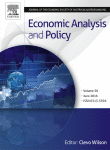
Economic Analysis and Policy
Transforming Policy with Insightful Economic AnalysisEconomic Analysis and Policy is an esteemed academic journal published by ELSEVIER, dedicated to advancing the field of economics and econometrics since its inception in 1970. Based in the Netherlands, this journal plays a pivotal role in disseminating high-quality research that addresses contemporary economic issues and policy challenges. With an impressive Q1 ranking in both the Economics and Econometrics categories, and recognition in the top 91st percentile of Scopus rankings, it is a leading platform for scholars, professionals, and students seeking to contribute to and engage with the evolution of economic thought. The journal does not currently operate on an open access model, allowing it to maintain rigorous peer-review standards that ensure the integrity and impact of published research. As a vital resource for anyone interested in the intersection of theory and policy in economics, Economic Analysis and Policy fosters a community committed to rigorous analysis and innovative solutions in the economic domain.
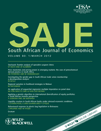
SOUTH AFRICAN JOURNAL OF ECONOMICS
Connecting scholars to critical economic discussions.The South African Journal of Economics, published by Wiley, has been a cornerstone in the field of economics since its inception in 1933. With its ISSN 0038-2280 and E-ISSN 1813-6982, this esteemed journal serves as a vital platform for researchers and scholars to disseminate innovative economic research and theory, while also engaging in critical discussions relevant to both local and global contexts. The journal has consistently ranked within the Q3 category in Economics and Econometrics, showcasing its contribution to the academic community, as reflected in its Scopus ranking of #328/716 in the subject area. Although it does not currently offer Open Access options, the journal remains dedicated to advancing economic thought and analysis through rigorous peer-reviewed articles that cover a broad range of topics. With a commitment to excellence and relevance, the South African Journal of Economics continues to attract a diverse readership of researchers, professionals, and students seeking to deepen their understanding of economic phenomena and policy implications.

Economic Computation and Economic Cybernetics Studies and Research
Transforming Economic Theories through Computational Innovation.Economic Computation and Economic Cybernetics Studies and Research, published by EDITURA ASE in Romania, serves as a vital platform for the dissemination of innovative research in the fields of applied mathematics, economics, and computer science applications. Established in 1968, this journal spans several decades of academic scholarship, converging expertise and insights that are instrumental in shaping current economic theories and methodologies. With an HIndex reflecting the impact of its contributions, the journal has garnered a Q4 ranking in Applied Mathematics and Computer Science Applications, alongside a Q3 distinction in Economics and Econometrics as of 2023. Its commitment to fostering an open exchange of ideas is crucial for researchers, professionals, and students who are navigating the complexities of economic cybernetics and computational economics. Although it operates without open-access options, its robust accessibility ensures that the research published within reaches a broad audience, further enhancing its relevance and importance in today’s rapidly evolving economic landscape.
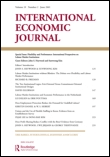
INTERNATIONAL ECONOMIC JOURNAL
Exploring Global Trends Through Rigorous Research.Welcome to the INTERNATIONAL ECONOMIC JOURNAL, a premier publication dedicated to advancing the fields of economics, econometrics, and finance. Established in 1987 and published by Taylor & Francis Ltd, this journal has consistently contributed to scholarly discourse and empirical research. With an impressive 2023 Scopus Ranking placing it at #112 out of 288 in its category, the journal holds a commendable Q2 quartile rating, reflecting its significant impact among economists and financial analysts alike. The INTERNATIONAL ECONOMIC JOURNAL serves as a vital platform for researchers and professionals to disseminate innovative findings, theoretical advancements, and practical applications in economic theory and policy. While not open access, the journal continues to attract a wide readership, offering insight into global economic trends and challenges. This makes it an essential resource for students, academics, and industry practitioners aiming to deepen their understanding of contemporary economic issues.
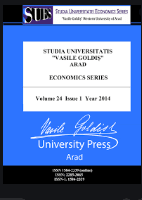
Studia Universitatis Vasile Goldis Arad Seria Stiinte Economice
Fostering Scholarly Excellence in Management StudiesStudia Universitatis Vasile Goldis Arad Seria Stiinte Economice is a distinguished academic journal published by SCIENDO, proudly contributing to the fields of Business, Economics, and Management since its transition to an open access format in 2007. With an ISSN of 1584-2339 and E-ISSN 2285-3065, this journal offers a platform for rigorous research and scholarly discourse, earning a respectable Q3 category ranking in 2023 across various domains such as Business and International Management, Economics and Econometrics, Finance, and Strategy and Management. The journal, situated in Poland, plays a pivotal role in disseminating knowledge and fostering innovation, thus serving as a valuable resource for researchers, professionals, and students committed to advancing their understanding of economic sciences. With Scopus rankings highlighting its competitive position within its categories, Studia Universitatis Vasile Goldis Arad is not just a journal, but a vital cornerstone for the academic community seeking to explore contemporary issues and strategies in the ever-evolving economic landscape.
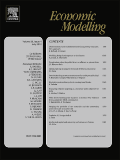
ECONOMIC MODELLING
Driving the Evolution of Economic Thought and Application.ECONOMIC MODELLING, published by Elsevier, is a leading academic journal in the field of Economics and Econometrics, with a commendable impact factor that underscores its significance within the research community. Since its inception in 1984, this journal has been pivotal in disseminating high-quality research that contributes to the advancement of theoretical and empirical methodologies in economics. As a Q1 journal in its category, it ranks in the top 88th percentile according to Scopus, solidifying its reputation as an influential platform for economists and academicians. Although it does not offer open access, the journal maintains a robust subscription model, ensuring wide distribution of critical insights and findings. Researchers, practitioners, and students are encouraged to engage with the latest developments in economic modelling, making ECONOMIC MODELLING an essential resource for anyone seeking to understand and contribute to the evolving landscape of economic theory and application.
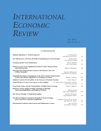
INTERNATIONAL ECONOMIC REVIEW
Pioneering insights that shape policy and practice.INTERNATIONAL ECONOMIC REVIEW is a prestigious journal dedicated to advancing knowledge in the fields of economics and econometrics. Published by Wiley in the United Kingdom, this journal boasts an impressive Q1 ranking in the 2023 category of Economics and Econometrics, reflecting its significant impact in the academic community. With a continued publication since its inception in 1979, it offers a platform for rigorous scholarly articles that address contemporary issues, theoretical developments, and empirical findings in economics. Although it does not currently offer open access options, the journal maintains broad accessibility through institutional subscriptions. Researchers, professionals, and students are encouraged to contribute to and engage with this leading publication to foster knowledge exchange and stimulate scholarly dialogue in economic research. With its commitment to high-quality scholarship, the INTERNATIONAL ECONOMIC REVIEW remains a vital resource for developing insights that inform both policy and practice.

Korean Economic Review
Elevating the conversation in economics and finance.Korean Economic Review is a distinguished academic journal published by the Korean Economic Association, dedicated to advancing the field of economics with a focus on both theoretical and empirical research. With an ISSN of 0254-3737, this journal serves as a vital platform for scholars and practitioners to disseminate innovative ideas and findings that enrich our understanding of economic phenomena. Operating in South Korea, the journal enjoys recognition within the academic community as evidenced by its Q3 ranking in the Economics, Econometrics and Finance categories as of 2023, placing it in a respectable position among its peers. While it does not currently offer open access options, its commitment to rigorous peer review ensures the publication of high-quality research. As the journal converges from 2012 to 2024, it continues to contribute to the global discourse on economic issues, making it an essential resource for researchers, students, and professionals striving to stay at the forefront of economic scholarship.

Econometrics, published by MDPI, is a prominent open access journal based in Switzerland, dedicated to advancing research in the fields of economics and econometrics. Since its inception in 2013, this journal has been pivotal in disseminating innovative theories and empirical findings, fostering an engaging dialogue among scholars and practitioners. With an impressive Q2 ranking in the 2023 category of Economics and Econometrics and a solid position at #378 out of 716 in Scopus rankings, it stands as a vital resource for those seeking to enhance their understanding and application of econometric methods. The journal offers immediate open access to its published articles, ensuring that researchers, professionals, and students alike can easily access and contribute to the evolving body of knowledge in this essential discipline. The scope of Econometrics encourages submissions that cover a broad array of topics, making it a dynamic platform for innovative research until 2024 and beyond.